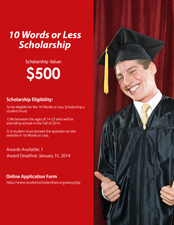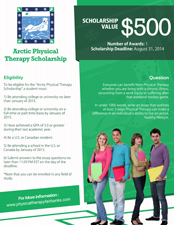The contest is open to United States high school students in grades nine through twelve attending public, private, parochial, or home schools; U.S. students under the age of twenty enrolled in a high school correspondence/GED program in any of the fifty states, the District of Columbia, or the U.S. territories; and U.S. citizens attending schools overseas. Past winners and finalists are not eligible to participate. Employees of sponsors and members of their families are not eligible to participate.
Requirements
- The contest deadline is January 12, 2026 at 11:59 PM (EST).
- Essays can be no more than 1,000 words but must be a minimum of 700 words. Citations and bibliography are not included in the word count.
- Essays must be the original work of the student. Essays may be checked for AI assistance and are disqualified if AI is detected at any point in the essay or bibliography. See Tips for Avoiding Plagiarism.
- Essays must have a minimum of five sources.
- Essays should not include identifying information about the author.
Essay Subjects
- Essays must describe an act of political courage by a U.S. elected official who served during or after 1917, the year John F. Kennedy was born. The official may have addressed an issue at the local, state, or national level. See Contest Topic and Information and Helpful Tips for Writing Your Essay for more information.
- Since originality is one of the criteria for judging, writing about any of these common essay subjects will lower your score.
- John F. Kennedy, Robert F. Kennedy, and Edward M. Kennedy are not eligible subjects for essays.
- Essays about past recipients of the Profile in Courage Award will be disqualified unless they describe an act of political courage other than the act for which the award was given.
- Please note that John Lewis received the Profile in Courage Award for Lifetime Achievement. As such, any essays about him will be disqualified.
- Essays about the senators in Profiles in Courage will be disqualified.
- Essays about subjects from past winning essays will receive a lower score.
Source Material
- Essays with fewer than five listed sources will be disqualified.
- All participants must cite sources they used to research their topic throughout their essay. Please use parenthetical citations within the text.
- We cannot accept citations in footnote form.
- Essays must include a bibliography. Accepted formats include APA, MLA, or Turabian. Please refer to Guidelines for Citations and Bibliographies.
Nominating Teachers
- All students must list the name of their nominating teacher on the registration form. The role of a nominating teacher is to provide students with support and advice during the writing of their essay. Nominating teachers are also asked to read students' essays to make suggestions for improvement before they are submitted to the essay contest. As part of this review process, the nominating teacher reviews the essay for syntax, grammatical, typographical and spelling errors and ensures the essay meets the contest requirements listed above. The first-place winner and their nominating teacher, as representatives of their school, will be invited to receive awards at the annual Profile in Courage Award ceremony held at the Kennedy Presidential Library in Boston.
- Nominating teachers can be former or current teachers, but must still be teaching at the same high school as the essay participant. Usually, students ask their English or History/Social Studies teachers. In very few cases, we will make an exception if a student is unable to ask a teacher from their high school to be their nominating teacher. The parent or legal guardian responsible for the instruction of home-schooled students can also serve as a nominating teacher. Homeschooled students also have the option to have a high school teacher from a previous school serve as their nominating teacher if the teacher emails essaycontest@jfklfoundation.org confirming this.










Scholarship Value: $10,000
Awards Available: 20
Award Deadline: Jan 12, 2026